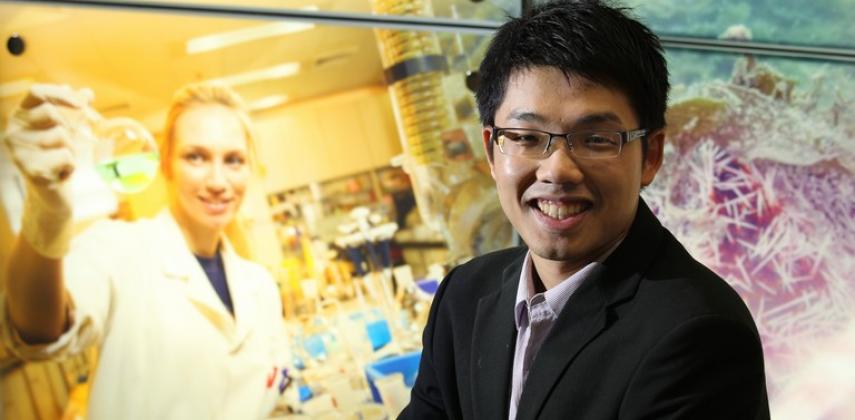Twenty-three-year-old Eric Chen, a City University (CityU) alumnus, is the founder and director of Vitargent (International) Biotechnology, a platform for innovative biochemical testing methods. Created by a CityU biology and chemistry professor, Cheng Shuk-han and her then-PhDs student Chen Xueping, the transgenic medaka fish assay is an accurate and cost-effective testing method to determine the level of Estrogenic Endocrine Disruptors (EEDs). These are harmful substances that can be used to test everyday consumer products including food, pharmaceuticals and cosmetics, and monitor the aquatic environment.
Almost invisible to the naked eye, the transgenic medaka fish larvae give off a green fluorescent glow when exposed to harmful oestrogen-like substances. "When fully developed, these testing methods will be as profitable as they are beneficial to society," Chen says.
What issues did you try to address as you established your own enterprise?
I was born and grew up in Guangzhou. I have experienced the mounting public concerns over food safety and pollution. These issues are partially traced to the lack of accurate and efficient testing methods. I think young people have the responsibility to attempt to develop solutions.
How did you initiate the collaboration with transgenic fish technology inventors at CityU?
After identifying the problem, I started searching for the technology. Although similar technologies were available in the United States and Europe, I focused my research locally and found out about the CityU's transgenic fish technology. Thanks to CityU's vice-president, Paul Lam, who is also chair professor at the biology and chemistry department, I was able to collaborate with Professor Cheng and Chen Xueping (now the chief technology officer at Vitargent).
I then formed a team to develop the business plan and entered the CityU's Outstanding Innovation Award in 2009 and other international business plan competitions.
What were the major challenges?
Because none of the original competition team members had any academic background in biochemistry, we needed to work extra hard in deepening our knowledge and understanding of the technology before we developed the business plan. We asked the help of professors in various disciplines who shared their insights and provided guidance.
The local investment environment does not facilitate development of advanced technologies.
Few investors in Hong Kong are interested in new high-tech enterprises because the risk is high and the investment is for the long term.
Passion and persistence helped us overcome many challenges. The learning curve was steep. We had to learn about management and finance while running the enterprise.
What are the practical applications of the technology?
The transgenic fish technology can be applied to detect EEDs in two main areas: aquatic environment and everyday consumer goods. We have worked with various government departments and several laboratories for the testing of pharmaceutical products. Our company has yet to officially roll out the technology.
Which aspects of the enterprise do you enjoy the most?
Asia-Pacific is still a `blue ocean' for advanced bio-testing technologies. Our technology is a breakthrough innovation which may have a major impact on society.
Awards for innovation
- Eric Chen and fellow students Flex Yang and Kunal Parwani of the City University won the CityU Outstanding Innovation Award in 2009 for their ingenious testing method based on a transgenic medaka fish assay.
- They won the Asian championship of the HSBC Young Entrepreneur Awards 2010 and the bronze award in the Lee Kuan Yew Global Business Plan Competition 2010.
- They also won a special prize in the Federation of Korean Industries and the gold prize in the Korean International Women's Invention Exposition 2010.


